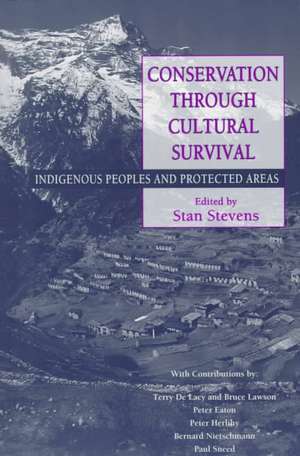Conservation Through Cultural Survival: Indigenous Peoples And Protected Areas
Contribuţii de Paul Sneed, Bernard Nietschmann, Terry DeLacy Dean Editat de Stanley Stevens Contribuţii de Peter Herlihyen Limba Engleză Paperback – 31 mar 1997
For more than a century the establishment of national parks and protected areas was a major threat to the survival of indigenous people. The creation of parks based on wilderness ideals outlawed traditional ways of life and forced from their homelands peoples who had shaped and preserved local ecosystems for centuries.
Today such tragic conflicts are being superseded by new alliances for conservation. Conservation Through Cultural Survival assesses cutting-edge efforts to establish new kinds of parks and protected areas which are based on partnerships with indigenous peoples. It chronicles new conservation thinking and the establishment around the world of indigenously inhabited protected areas, provides detailed case studies of the most important types of co-managed and indigenously managed areas, and offers guidelines, models, and recommendations for international action. The book:
Today such tragic conflicts are being superseded by new alliances for conservation. Conservation Through Cultural Survival assesses cutting-edge efforts to establish new kinds of parks and protected areas which are based on partnerships with indigenous peoples. It chronicles new conservation thinking and the establishment around the world of indigenously inhabited protected areas, provides detailed case studies of the most important types of co-managed and indigenously managed areas, and offers guidelines, models, and recommendations for international action. The book:
- discusses the goals and development of the global protected area system
- assesses the strengths and limitations of a range of different types of indigenously inhabited protected areas
- discusses key issues and indigenous peoples' concerns
- recommends measures to promote conservation
- suggests international actions that would promote co-managed and indigenously managed areas
Preț: 341.41 lei
Nou
Puncte Express: 512
Preț estimativ în valută:
65.34€ • 67.87$ • 54.27£
65.34€ • 67.87$ • 54.27£
Carte indisponibilă temporar
Doresc să fiu notificat când acest titlu va fi disponibil:
Se trimite...
Preluare comenzi: 021 569.72.76
Specificații
ISBN-13: 9781559634496
ISBN-10: 1559634499
Pagini: 383
Dimensiuni: 152 x 229 x 28 mm
Greutate: 0.52 kg
Ediția:None
Editura: Island Press
Colecția Island Press
ISBN-10: 1559634499
Pagini: 383
Dimensiuni: 152 x 229 x 28 mm
Greutate: 0.52 kg
Ediția:None
Editura: Island Press
Colecția Island Press
Notă biografică
Stan Stevens is adjunct associate professor in the department of geosciences at the University of Massachusetts, Amherst.
Cuprins
List of Tables
Acronyms
Acknowledgments
Introduction
PART I. Protected Areas and Indigenous Peoples
Chapter 1. The Legacy of Yellowstone
Chapter 2. New Alliances for Conservation
Chapter 3. Consultation, Co-management, and Conflict in Sagarmatha (Mount Everest) National Park, Nepal
Chapter 4. Indigenous Peoples and Biosphere Reserve Conservation in the Mosquitia Rain Forest Corridor, Honduras
PART II. Co-management
Chapter 5. National Parklands and Northern Homelands: Toward Co-management of National Parks in Alaska and the Yukon
Chapter 6. The Uluru-Kakadu Model: Joint Management Of Aboriginal-owned National Parks In Australia
PART III. Indigenous Management
Chapter 7. Protecting Indigenous Coral Reefs And Sea Territories, Miskito Coast, Raan, Nicaragua
Chapter 8. Reinforcing Traditional Tenure: Wildlife Management Areas In Papua New Guinea
Chapter 9. Annapurna Conservation Area: Empowerment, Conservation, And Development In Nepal
PART IV. Linking Indigenous Rights And Conservation
Chapter 10. Lessons And Directions
Notes
Bibliography
Index
Acronyms
Acknowledgments
Introduction
PART I. Protected Areas and Indigenous Peoples
Chapter 1. The Legacy of Yellowstone
Chapter 2. New Alliances for Conservation
Chapter 3. Consultation, Co-management, and Conflict in Sagarmatha (Mount Everest) National Park, Nepal
Chapter 4. Indigenous Peoples and Biosphere Reserve Conservation in the Mosquitia Rain Forest Corridor, Honduras
PART II. Co-management
Chapter 5. National Parklands and Northern Homelands: Toward Co-management of National Parks in Alaska and the Yukon
Chapter 6. The Uluru-Kakadu Model: Joint Management Of Aboriginal-owned National Parks In Australia
PART III. Indigenous Management
Chapter 7. Protecting Indigenous Coral Reefs And Sea Territories, Miskito Coast, Raan, Nicaragua
Chapter 8. Reinforcing Traditional Tenure: Wildlife Management Areas In Papua New Guinea
Chapter 9. Annapurna Conservation Area: Empowerment, Conservation, And Development In Nepal
PART IV. Linking Indigenous Rights And Conservation
Chapter 10. Lessons And Directions
Notes
Bibliography
Index
